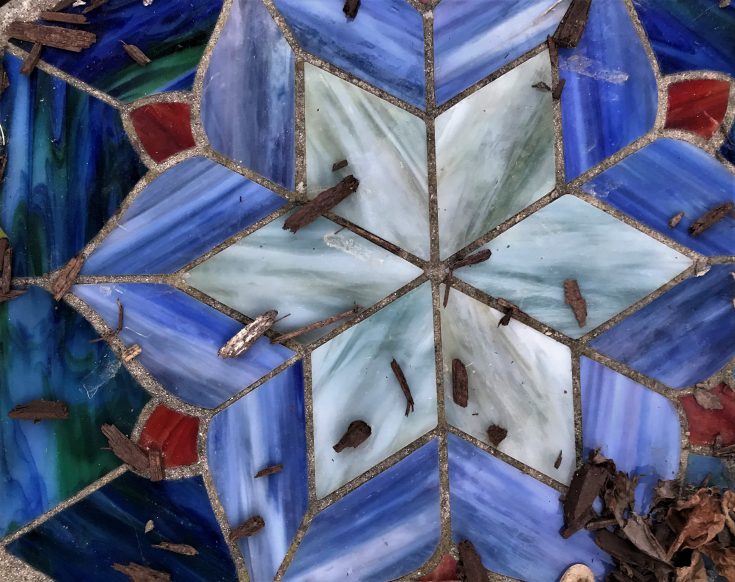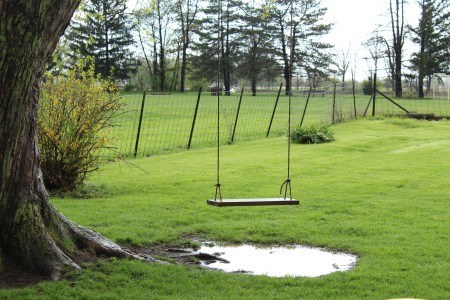- Home
- Daily Meditation
Thinking Like Moses
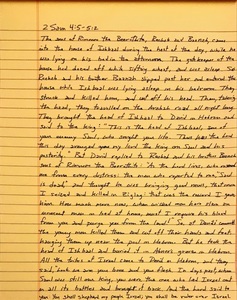
2Sam 4:5-5:2
Synopsis 2Sam 4:5-5:2 11/21/2018
Ishbaal was the king of Israel after his father Saul. Among his many workers, there were two whose names were Rechab and Baanah. Their heritage descended from the city of Beeroth. The people of this city seem to have been assimilated into the tribe of Benjamin.
Rechab and Baanah killed Ishbaal while he slept in his own house. Expecting a reward, they then took his head and travelled to David in Hebron. When they presented Ishbaal’s head to David, he mourned Ishbaal’s death and executed Rechab and Baanah for the murder they had committed. And then David buried Ishbaal’s remains in Abner’s grave.
After this, the leaders of all Israel came to David in Hebron. They reminded him that when Saul was king, David was the one who led the armies of Israel to many great victories. And they acknowledged the open secret that David had been anointed king by Samuel.
David Thought Like Moses
Rechab and Baanah came to David with King Ishbaal’s head thinking that David would be pleased. And they probably thought they were in line for a great reward.
But David feared God. And David trusted God. His response to the men who came to him was, “As the Lord lives, who rescued me from every distress…” David was telling them that he didn’t need this kind of help. He didn’t intend to take the throne through unlawful, evil acts committed against innocent people. And so, he had them executed in order to purge this kind of evil from the community of Israel.
David’s inclination was to think like Moses. He was concerned about the purity of the people because the continued presence of God depended on the people remaining pure.
Thinking Like Moses
For Moses, relationship with God was everything. And anything that threatened to offend God and injure the relationship he avoided.
I have these ideas – what God intends for my life. I imagine how things will play out for me. That’s not bad. I’d even go so far as to say it’s good and right. But the danger is in thinking that anything that advances my earthly purposes is good and right.
This is how I imperil my relationship with God.
So, let the days come as they are given. If they advance what I understand to be my “purpose in life”, so be it. That’s great. But if the advances for some earthly goal come at the expense of another person, then it’s not worth it. My guilt and shame will invariably ruin my interest in making myself present before the Lord. The relationship will break.
The command is to love. The refining process I experience here is to purify my capacity to love. This is relationship with the God of Love. Nothing else that I might ever accomplish matters as much as holding dear my relationship with Jesus.
“Because zeal for your house has consumed me, I am scorned by those who scorn you.” Psalm 69:10
I Will Put My Trust In God Alone

2Sam 3:32-4:4
Synopsis 2Sam 3:32-4:4 11/21/2018
David mourned and fasted over Abner’s death. And because of his lament and public grief, all Israel knew that he was innocent. David also expressed his frustration with Joab. And he prayed for the Lord to repay Joab for his ruthlessness.
Soon enough, Ishbaal heard about Abner’s death. The news made him despondent. His mental state was so affected that the whole nation became anxious.
Ishbaal Put His Trust In Abner Alone
Ishbaal had put his trust in Abner. And he did this not without reason. Abner was a great man. He was a legendary leader in Israel. And he was the one who had actually crowned Ishbaal king in the first place.
So, it made sense that Ishbaal would seek Abner to continue to assist in leading the nation. But Ishbaal had empowered Abner beyond mere assistance. In fact, he had given over power in exchange for the prestige of the throne and the guarantee of his personal safety. His trust in Abner was an unhealthy dependency that left him helpless once Abner had died.
I Will Put My Trust In God Alone
It’s been a year of lessons for me.
People die – they don’t live forever. And when they’re gone, the role they filled in my life is unavoidably affected. And the extent to which I was relying on that other person is exposed.
It’s not just grief at the loss. Feeling the sadness is right. It’s appropriate. And it’s necessary.
But despondency and the inability to go on is more than grief. It’s a calling out. For God created me capable of meeting the challenges of my life. It’s only in my misplaced trust in another person, or in my misguided abdication of personal responsibility, that I feel vulnerable.
None of this is from God. And so I have a decision to make.
“Trust in the Lord O my soul” – it’s not a euphemism. It’s the decision I have to make.
“Thus says the LORD: Cursed is the man who trusts in human beings, who makes flesh his strength, whose heart turns away from the LORD. He is like a barren bush in the wasteland that enjoys no change of season, But stands in lava beds in the wilderness, a land, salty and uninhabited. Blessed are those who trust in the LORD; the LORD will be their trust. They are like a tree planted beside the waters that stretches out its roots to the stream: It does not fear heat when it comes, its leaves stay green; In the year of drought it shows no distress, but still produces fruit.” Jer 17:5-8
Rightly Responding to Value
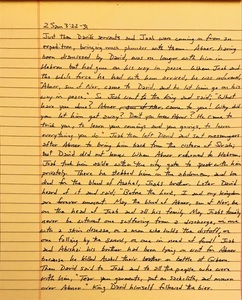
2Sam 3:22-31
Synopsis 2Sam 3:22-31 11/20/2018
Abner decided to switch allegiance to David. David ruled as king over Judah in the city of Hebron. So, Abner met with him there. Together they formed a covenant to peacefully bring David to power over all of the tribes of Israel.
David made a celebration feast for Abner. And then, he sent him on his way to begin the process of securing the kingdom.
Just after Abner’s departure, Joab returned from a successful campaign. He had brought back a large amount of plunder to give to David. And then Joab heard that Abner had just been there. So, he asked David the purpose for the meeting. But Joab did not wait for an answer. Instead he left David. And then he sent messengers and called for Abner to return.
When Abner returned, Joab killed him. When David heard the report, he grieved. Unsurprisingly, he mourned Abner’s death. And he instructed Joab and all of Judah to do the same.
David Responded To Value Rightly
David put on sackcloth and ashes. He grieved Abner’s death. It was a bitter pill personally. But it was also a loss for the nation. And even more than that, it was contrary to what God had begun to accomplish both in Abner’s life and in the reunification of the nation. And so, he followed the bier on the way to bury Abner. He felt the loss of the general officer over the army of the Chosen People.
Rightly Responding to Value
The experience of Abner’s death remains all around. People injure and kill one another. It happens so often and in so many varied ways, that I have become numb. The television is too big. The internet is too complete. I honestly can’t take it all in. I can’t “feel it” all in. My affections are overwhelmed.
Yet, here is a fundamental Christian claim – the value is there whether I experience it or not.
Still I have a role to play. My job is to find a way to slow down and experience value as it is given.
“God looked at everything he had made, and found it very good. Evening came, and morning followed—the sixth day.” Gen 1:31
Patience, Plans and Dreams
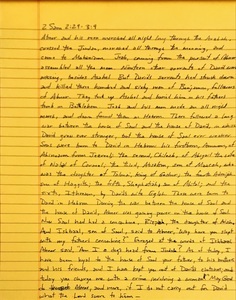
2Sam 2:29-3:9
Synopsis 2Sam 2:29-3:9 11/17/2018
The two armies finally quit the fight. This concluded the battle of Gibeon. After the battle, Abner marched his troops through the night to Mahanaim, on the east side of the Jordan. Joab returned to Hebron after making a stop in Bethlehem to bury his brother Asahel.
The battle of Gibeon began a long-running war between the tribe of Judah and the tribe of Benjamin. As king, David led the forces of Judah. Likewise, Saul’s son Ishbaal was king over the northern tribes. Over the course of these years of war, David increased in power over the tribe of Judah. And he increased in popularity with all the Israelites.
Because of this, Ishbaal was generally perceived as decreasing in power. Ishbaal blamed Abner and eventually accused him of a crime. However, Abner rebuked him and vowed to no longer protect him from David’s rise.
Meanwhile, David fathered six sons with six different wives while he lived and ruled from Hebron.
David’s Patience
David was at war with Ishbaal and Abner. But it wasn’t a total war. He did not attempt to force a final confrontation. In the same way, he did not attempt to force his reign on the northern tribes. Instead, he focused on ruling over the tribe of Judah well. And, he matched aggression with the army that remained loyal to Ishbaal and Abner.
And he waited. He didn’t move until God moved him.
Patience, Plans and Dreams
I need direction in order to succeed. So, I need the “Big Story” of my life to be fairly clear. I need to have a dream that I’m chasing. I need a sense of what God is endeavoring to accomplish in me and through me.
But I also need a plan. I need a routine of daily activity that positions me to achieve the larger dream.
Yet, even more important than either of these, I need patience. I need to be willing to allow God to deliver my dream in His time.
“I wait for the LORD, my soul waits and I hope for his word. My soul looks for the Lord more than sentinels for daybreak. More than sentinels for daybreak,” Psalm 130:5-6
Bitterness and a Divided Kingdom
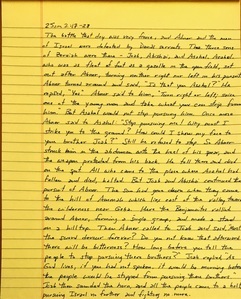
2Sam 2:17-28
Synopsis 2Sam 2:17-28 11/16/2018
The competition of the twenty-four men was a draw. Twelve each from the army of Israel and David’s army had ended with everyone dead. And then a larger battle broke out between the two armies.
David’s army was led by Joab. They defeated the army of Israel which was led by Abner. Then, Joab’s brother Asahel began to pursue Abner as the army fled.
The two men knew each other personally. And Asahel knew that Abner was the power behind King Ishbaal’s throne. He thought that if Abner were killed, then all of Israel would abandon King Ishbaal and come over to accepting David as king.
However, Abner was the more seasoned warrior. He warned Ashahel twice before finally killing him. Despite this, Joab continued his pursuit. Finally, as night fell, Abner rallied his troops and persuaded Joab to stop the fight.
Bitterness and a Divided Kingdom
Both Abner and David wanted a united Israelite kingdom. And Abner realized that the dream of reunification would be more difficult if the people were embittered with each other because of a massacre.
It was a point that even the ever-aggressive Joab could understand.
Bitterness and a Divided Family
I tend to think that the things I said and did to my brother and sisters thirty years ago don’t really make a difference. But the truth is, if I haven’t reconciled some offense, then it remains.
The bitterness of emotional injury is ever near. Of course, it’s usually hidden. But the bitter memories lie in wait for some new slight to reopen a wound. And then, to once again strain the relationship.
“All bitterness, fury, anger, shouting, and reviling must be removed from you, along with all malice. [And] be kind to one another, compassionate, forgiving one another as God has forgiven you in Christ.” Eph 4:31-32
Family Fight Never Yield A Winner
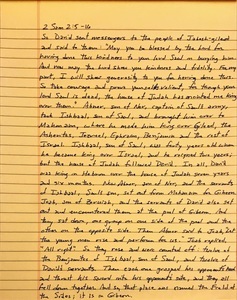
2Sam 2:5-16
Synopsis 2Sam 2:5-16 11/14/2108
David made a friendly overture to the tribal leaders of Benjamin. He sent his greetings. And, because they had remained faithful to Saul, he promised to be generous with them . He also told them that the leaders of Judah had made him their king.
Abner was Saul’s cousin. And he was the leader of Saul’s army. So, after Saul’s death, Abner crowned Ishbaal king over Israel. Ishbaal was one of Saul’s surviving sons. David’s army was led by Joab, one of the men who had followed David while in the wilderness. Ishbaal’s army was led by Abner.
Sometime after Ishbaal had been crowned, Joab encountered Abner near Gibeon. Both men were leading their armies. Abner commanded the army of Israel. And Joab commanded the army of David.
So, Abner proposed that select young men from each army compete as a possible replacement for an all-out war. And Joab agreed to this. Accordingly, the leaders of each army selected twelve men. But at the end of the competition, all the contestants died. So, the contest was a draw.
Tribal Disputes Can Never Be Won Through Battle
Abner proposed a contest instead of having a larger battle. And Joab agreed. But, the contest was a draw. Twelve men from each army fought in a competition and all twenty-four ended up dead. And so, the contest served as a metaphor for the futility of civil war.
The injury of brother fighting brother was not worth whatever outcome each side hoped to achieve.
Family Fights Never Yield A Winner
No one is surprised when members of the same family fight because it’s so common. And yet, it really should be shocking. But the shocking part isn’t that people should fight there own family members. The shocking part is that anyone thinks they could be successful after injuring his brother.
“But he knew what they were thinking and said to them, ‘Every kingdom divided against itself will be laid waste, and no town or house divided against itself will stand” Matt 12:25
Learning To Listen First
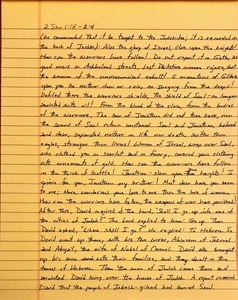
2Sam 1:18-2:4
Synopsis 2Sam 1:18-2:4 11/13/2018
Saul and Jonathan’s deaths grieved David. So, in his grief, he chanted a lament for the fallen king and his sons. And some of his men wrote down his chant. After that, David commanded that the Judahites learn it and sing it. He wanted the people of Judah to sing it as a memorial to Saul and Jonathan.
Then David asked the Lord whether he should remain in Ziklag or return to one of the cities of Judah. God told him to go up to Hebron. Also, David brought his warriors with him. They all settled in the vicinity of Hebron.
Shortly thereafter, the leaders of the tribe of Judah came to him. And they anointed him and declared him king over the tribe of Judah.
David Had Learned To Inquire Of God First
David had recognized God’s purpose in his decision to fight against Goliath. And, as a general officer in Saul’s army, he faithfully sought out God’s plans with great success. Similarly, he had regularly inquired of the Lord while escaping from Saul’s pursuit in the wilderness.
But there is no mention that he had sought the Lord when he made his famous plan to subvert the Philistine battle plan at Mount Gilboa. However, after the disaster at Ziklag, he once again inquired of God.
David’s experiences had taught him. He had learned not to proceed with his own plans until it was clear that God was leading him. And so, it was only when God had given a clear direction, that he returned to Judah. As a result, he returned in great humility. And it was only then that the leaders of the tribe of Judah chose to crown him their king.
Learning To Listen First
When things are going well and I’m not doing anything that is obviously wrong, my tendency is to think that I’m doing what God wants me to – that I’m walking in God’s plan.
Even now, God really does speak. But He generally uses an unimaginably small voice. Still, if I spend the time to quiet myself and listen – really listen – He never disappoints.
“Be still before the LORD; wait for him. Do not be provoked by the prosperous, nor by malicious schemers.” Psalm 37:7
Tragedy Is Not Opportunity
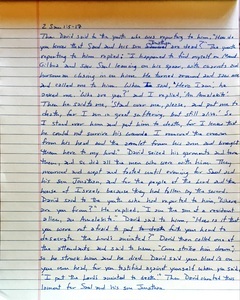
2Sam 1:5-17
Synopsis 2Sam 1:5-17 11/12/2018
David was back in Ziklag. And soon, a young man came to him with news from the battle of Mount Gilboa. He reported that King Saul and his son Jonathan were dead.
David wanted to know more. He demanded details from the youth. So, the young man told a story of how he had encountered the mortally wounded King Saul on the mountain. And he recounted how Saul had asked the young man to finish him. Accordingly, the young man reported how he had obliged Saul’s request.
After that, he had stripped Saul’s body of his crown and armlet. The young man, who turned out to be the son of an Amalekite living in Israel, had brought the royal objects to David.
David was incredulous that anyone would strike the Lord’s anointed king. But he seemed particularly incensed that an Amalekite would have such audacity. He commanded his men to put the young man to death for killing the king of Israel.
Saul’s Death Not Opportunity
The young Amalekite lived in Israel. He was the son of a resident alien. But he knew enough about the intrigues between Saul and David to understand that David might be the next king.
So, having removed King Saul’s crown and armlet, he didn’t take them to Saul’s relatives. Instead, he brought them to David. He was thinking he might gain David’s favor. Or, he might have even been thinking that David would offer a reward.
But, David wasn’t having it. For him, it was an abomination that anyone might benefit from the tragic end of the Lord’s anointed king.
Tragedy Is Not Opportunity
There is little that violates the solidarity of community more than taking advantage of other people when they are weak.
This is basic. My spirit will never intuitively rejoice when tragedy befalls another.
But the world can be a rat race. And on the rat race, almost anything goes. So here’s my reminder: Taking advantage of another person’s tragedy will never profit in the long term. The harm to my soul will always outweigh the temporary benefit accrued.
“Do not rejoice when your enemies fall, and when they stumble, do not let your heart exult”, Prov 24:17
Protecting the Dignity of Others
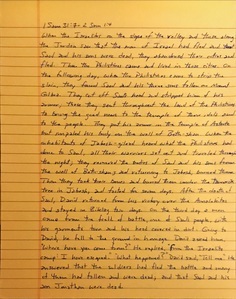
1Sam 31:7-2Sam 1:4
Synopsis 1Sam 31:7-2Sam 1:4 11/11/2018
The Philistines defeated the army of Israel at Mount Gilboa. And Saul and his sons were dead. So, the Israelites living in the region fled from their homes in fear of the Philistines. As a result, the Philistines occupied several cities in the central region of Israel.
The Philistines discovered Saul’s body the day after the battle. They also found the bodies of Saul’s sons nearby. So, they exposed Saul’s body by hanging it on the walls of Beth-shan. But they cut off his head and carried it back to their homeland as a celebration of their victory.
Meanwhile, David was with his men in Ziklag. After their victory over the Amalekite raiders, they returned there. And so, it wasn’t long before news of Saul and Jonathan’s death came to David.
Jabesh Honored Saul After His Death
The warriors from Saul’s hometown heard about how his body had been desecrated. So they made a special mission to recover Saul and his sons bodies. They worked in the dark of night to recover Saul’s body. Then they took the dead back to their home town.
Upon returning to Jabesh, they burned the bodies of the fallen king and his princes. And then they buried their bones in a secret place in order to prevent further desecration.
These men risked their lives to preserve the dignity of a dead king.
Protecting the Dignity of Others
If I see the world rightly, then I recognize something intrinsic about the dignity of every human being. God has created every person I meet in His image. So every person I meet rightly deserves my reverence and respect.
And we hold this truth deep in our psyche.
But sometimes I fail to live it out.
So, there’s a certain challenge in encountering men and women who are willing to risk everything to reverence the dignity of other human beings. It resonates. I know that’s what is right. Perhaps it’s time to stop taking this for granted.
Think of all the people in your community who have committed their lives to protecting and preserving the lives of the people you love.
And then, let your heart be filled with gratitude to the God who has made us all.
“Do you not know that you are the temple of God, and that the Spirit of God dwells in you?” 1 Cor 3:16
God’s Not Finished With You Yet
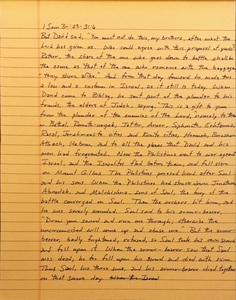
1Sam 30:23-31:6
Synopsis 1Sam 30:23-31:6 11/10/2018
After the defeat of the Amalekite raiders, a dispute arose. Should those who guarded baggage share in the plunder equally with those who actually fought the Amalekites? So, David resolved the dispute. He made it a rule that those who remained guarding the baggage shared equally with those who fought on the frontlines of battle.
Meanwhile, Saul and the army of Israel fought against the Philistines at Mount Gilboa. The Israelites fled and a slaughter ensued. The Philistines killed Saul’s sons. And then, they struck Saul with arrows.
Being mortally wounded, he commanded his armor-bearer to strike him dead. But the armor-bearer was too afraid to comply. So Saul took his own life by falling on a sword before the Philistines could capture him.
Saul Killed Himself
Saul killed himself. He did so to prevent capture by the Philistines. A hopeless man committed a desperate act.
It seems pretty clear that Saul struggled with anxiety and depression for years. There is no recrimination. Concerning Saul, no human being can rightly make a judgement or condemnation. For us who encounter his story, it just is what it is.
God’s Not Finished With You Yet
But depression and anxiety remain. They are affective disorders. So, I may feel anxious or even depressed without my circumstances actually changing for the worse. Or, for the better. The “truth” of my situation can remain the same. But my experience does not.
Affective means “value perceiving”. And so, the common denominator for these maladies seems to be an inability to rightly perceive value. It’s not a moral failure. It’s a condition in the brain.
Though not pretending to understand another person’s suffering, I give thanks for the life being lived. For every courage-filled moment that an afflicted person stays in the game and keeps on contributing, I give thanks for a life of contribution.
Because, no matter the ability or inability to perceive value, if you have breath then God’s not finished with you yet.
“I am confident of this, that the one who began a good work in you will continue to complete it until the day of Christ Jesus.” Phil 1:6

